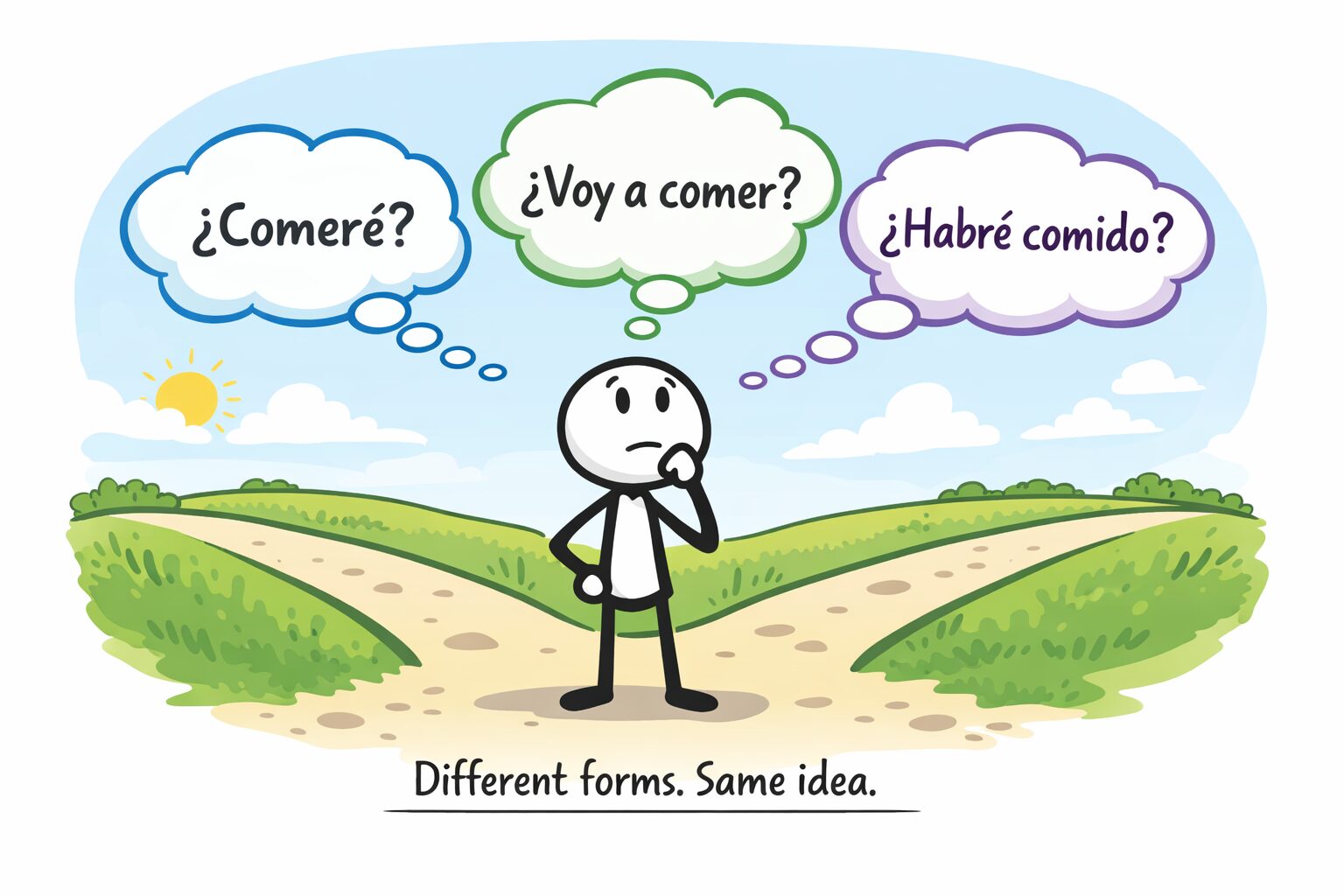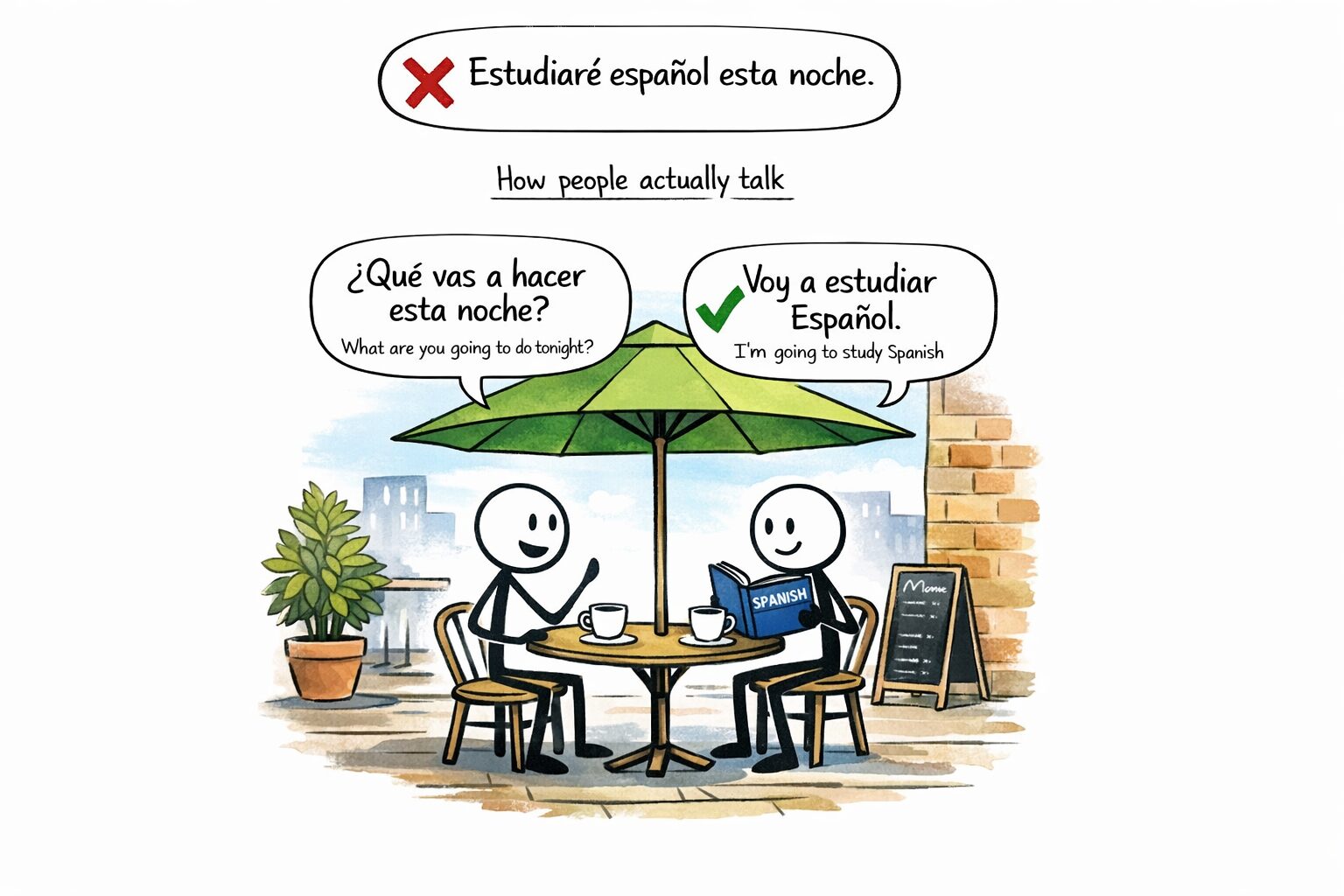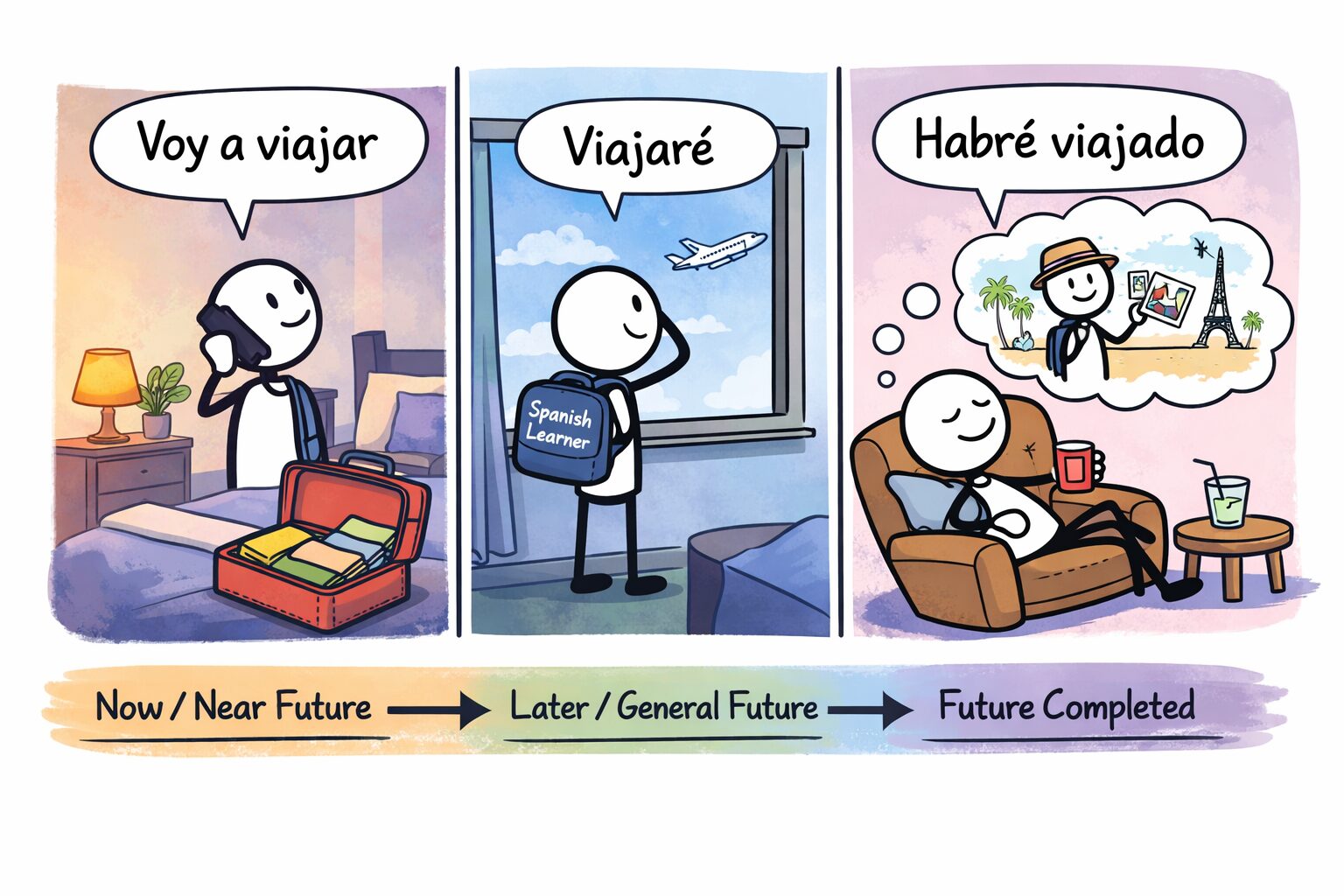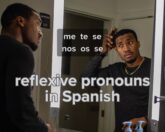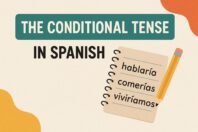Future Tense in Spanish Explained (How to conjugate + Examples)

Get our free email course, Shortcut to Conversational.
Have conversations faster, understand people when they speak fast, and other tested tips to learn faster.
More infoThe future tense in Spanish is often easier than learners expect. While verb tenses can feel intimidating at first, Spanish keeps things refreshingly simple when it comes to talking about the future.
In everyday Spanish, there are three main ways to express future actions, all of which closely mirror structures you already use in English:
- Simple Future (I will visit my grandparents)
- “Ir a” + Infinitive Verb (I’m going to visit my grandparents)
- Future Perfect (I will have visited my grandparents)
The first thing you will notice is that the above examples mean the same thing (more or less), meaning in most cases you can interchange all three forms of the future tense and still sound completely natural.
1. Simple Future (Futuro Simple)
The first tense is Simple Future (Futuro simple), which is used to describe actions that will happen in the future, without indicating a specific point in time. The action may occur soon, far in the future, or even decades from now.
For example:
- I will go out for dinner
- I will buy a new car
- We will move to Europe
You can also use this tense to describe an intention or assumption related to the future, in addition to a promise or a declaration of certainty that an action will be completed.
- I will lose 2kg by going to the gym
- You will have more free time after the exam
- We will go on vacation once I save enough money
Finally, you can use this tense to ask questions about future plans.
- Will you go to university?
- Will we meet up with tonight?
- Will they come to the concert?
How To Conjugate The Simple Future Tense in Spanish
The conjugation for simple future is relatively easy to remember, as the endings for AR, IR & ER verbs are all the same.
For regular verbs, all you need to do is hook the ending onto the infinitive form of the verb.
Personal Pronoun |
Comprar(To buy) |
Ver(To see) |
Abrir(To open) |
| Yo | Compraré | Veré | Abriré |
| Tú | Comprarás | Verás | Abrirás |
| Él / Ella | Comprará | Verá | Abrirá |
| Usted | Comprará | Verá | Abrirá |
| Nosotros | Compraremos | Veremos | Abriremos |
| Vosotros | Compraréis | Veréis | Abriréis |
| Ustedes | Comprarán | Verán | Abrirán |
| Ellos / Ellas | Comprarán | Verán | Abrirán |
Used in real sentences, it looks like this:
- El año que viene compraré una casa nueva – I will buy a new house next year
- El restaurante cerrará más temprano – The restaurant will close earlier
- No encontrarás un mejor precio – You won’t find a better price
- Te gustará la nueva oficina – You will like the new office
Irregular Verbs In Simple Future in Spanish
As always, there are irregular verbs that you must treat differently.
In this case, the irregular verbs have a different stem and do not use the infinitive form of the verb. Instead, you must memorize the new stem of the verb, and add the ending’s that we just covered.
Here are some of the most commonly used irregular verbs in the future tense:
(Scroll across the table for more verbs)
Pronoun |
Querer(To want) |
Saber(To know) |
Tener(To have) |
Hacer(To do/ make) |
Decir(To Say) |
Poner(To put) |
Venir(To come) |
Yo |
Querré |
Sabré |
Tendré |
Haré |
Diré |
Pondré |
Vendré |
Tú |
Querrás |
Sabrás |
Tendrás |
Harás |
Dirás |
Pondrás |
Vendrás |
Él / Ella |
Querrá |
Sabrá |
Tendrá |
Hará |
Dirá |
Pondrá |
Vendrá |
Usted |
Querrá |
Sabrá |
Tendrá |
Hará |
Dirá |
Pondrá |
Vendrá |
Nosotros |
Querremos |
Sabremos |
Tendremos |
Haremos |
Diremos |
Pondremos |
Vendremos |
Vosotros |
Querréis |
Sabréis |
Tendréis |
Haréis |
Diréis |
Pondréis |
Vendréis |
Ustedes |
Querrán |
Sabrán |
Tendrán |
Harán |
Dirán |
Pondrán |
Vendrán |
Ellos / Ellas |
Querrán |
Sabrán |
Tendrán |
Harán |
Dirán |
Pondrán |
Vendrán |
Except for nosotros, Spanish simple future tense conjugations are stressed on the final syllable, making them easy to recognize.
Now, let’s take a look at some examples:
- Ellos vendrán a visitarnos esta noche – They will come to visit us tonight
- Él me dirá la verdad – He will tell me the truth
- ¿Cuándo sabré los resultados del examen? – When will I know the results of the test?
- ¿Vendrás a la reunión este domingo? – Will you come to the meeting this Sunday?
That’s it – you now know an easy way to speak about the future in Spanish, and the next way is even easier than what we covered.
2. Ir a + Infinitive Verb (Going to)
One of the most common ways to talk about the future in Spanish is ir a + infinitive, the equivalent of “going to” in English.
For example:
- I’m going to visit my brother on the weekend
- We’re going to get tickets for the football match
- They’re going to come later
In both English and Spanish, you can use “going to + action” to indicate plans and talk about actions that are meant to occur in the near future.
At BaseLang we actually encourage beginner students to skip learning the simple future tense (the one we just covered) until they reach a more advanced stage. Instead, we teach them what we like to call the “Voy A Hack” which allows you to speak in the future, without actually learning the future tense.
This may sound strange, but we have some good reasons for preferring the “Voy A Hack”:
- It’s easy to learn
- It can be used in almost every situation when you want to talk about the future
- Native speakers tend to prefer this combination instead of simple future tense we covered.
You can learn more about the Voy A Hack in this article.
To conjugate in this form, we use the verb Ir (to go), the preposition “a” + the action verb in its infinitive form:
Ir a + Infinitive Verb
When conjugated in the simple present tense, the structure looks like this:
- Voy a comer pizza esta noche – I’m going to eat pizza tonight
- Voy a visitar España el próximo año – I’m going to visit Spain next year
The verb IR (to go) tells us that an action is about to take place, or will take place in the near future. It could be in a few seconds, minutes or hours.
The real meaning of the sentence is dependent on the infinitive action verb.
For example:
- Voy a comer – I’m going to eat
- Voy a pedir – I’m going to order
- Voy a ir – I’m going to go
Once you know the IR conjugation, speaking in the future tense will easily become second nature to you.
Below is the conjugated form of Ir + a:
Personal Pronoun |
Ir + a |
| Yo | Voy a |
| Tú | Vas a |
| Él / Ella | Va a |
| Usted | Va a |
| Nosotros | Vamos a |
| Vosotros | Váis a |
| Ustedes | Van a |
| Ellos / Ellas | Van a |
When combined with the action verb in its infinitive form, it will look like this:
- Voy a viajar a España – I’m going to travel to Spain
- Vamos a comprar una casa nueva – We’re going to buy a new house.
- Ellos van a tener gemelos – They’re going to have twins
- ¿Vas a estudiar para el examen? – Are you going to study for the test?
- Él va a cepillarse los dientes – He is going to brush his teeth
Simple Future vs IR a + Infinitive Verb
How do you decide when to use simple future, or the Ir a + infinitive verb conjugation (ie. Voy a Hack)?
The truth is that you can use both.
As mentioned before, BaseLang students first learn the “Ir a + infinitive verb” form, due to its simplicity and the fact that it is more commonly usedcompared to the simple future tense which is similar, but normally refers to an action in the long-term.
Just look at these phrases:
- Voy a dormir. – I’m going to sleep
- Dormiré – I will sleep
- Vamos a visitar a mis padres – We’re going to visit my parents
- Visitaremos a mis padres – We will visit my parents
The above sentences mean the exact same, and in many cases, both forms can be used interchangeably. The subtle difference is that when a specific time frame isn’t mentioned, we can assume that the “Ir a + infinitive verb” form is referring to some time in the near future.
If you want to be more precise, in both tenses, you can add words such as mañana, la semana que viene, en unas horas, etc., to indicate that it will happen at a specific point in time.
Similarly, we can use both tenses to talk about a future action that is uncertain, as long as the sentence includes a phrase that expresses uncertainty before the tense (e.g. I believe, I doubt, I don’t know if).
- No sé si voy a tener tiempo para dormir – I don’t know if I’m going to have time to sleep
- No sé si tendré tiempo para dormir – I don’t know if I’ll have time to sleep
- Creo que voy a ir al concierto este domingo – I think I’m going to go to the concert this Sunday
- Creo que iré al concierto este domingo – I think I will go to the concert this Sunday
3. Spanish Future Perfect
The future perfect tense in Spanish describes actions that will be completed by a specific point in the future, like:
- Habré terminado la asignación el próximo mes – I will have finished the assignment by next month.
Or to indicate an action that we guess could have happened, but it’s not certain that it actually did happen.
- María no está en la oficina, habrá salido más temprano – María is not in the office, she must have left earlier.
If you know how to use the present perfect tense, then this conjugation will be very familiar to you, as it also uses the auxiliary verb “Haber”, plus the past participle of the main verb.
Related: We wrote a simple guide to understanding the Present Perfect,which you can read here
To use future perfect, you need to conjugate “Haber” in the future tense and add the past participle of the action verb.
Personal Pronoun |
To have(simple future):Haber |
Past participle(To finish):Terminar |
Past participle(To go):Ir |
Past participle (To eat):Comer |
| Yo | Habré | Terminado | Ido | Comido |
| Tú | Habrás | Terminado | Ido | Comido |
| Él / Ella | Habrá | Terminado | Ido | Comido |
| Usted | Habrá | Terminado | Ido | Comido |
| Nosotros | Habremos | Terminado | Ido | Comido |
| Vosotros | Habréis | Terminado | Ido | Comido |
| Ustedes | Habrán | Terminado | Ido | Comido |
| Ellos / Ellas | Habrán | Terminado | Ido | Comido |
Let’s take a look at some example sentences:
- La próxima semana ya habré vendido todos mis muebles – I will have sold all my furniture by next week.
- El año entrante habremos alcanzado nuestra meta – We will have reached our goal by the upcoming year.
- ¿Habrán cerrado la tienda? – Will they have closed the store?
Quick Comparison: Spanish Future Tenses at a Glance
Spanish Future Form |
Structure |
When it’s used |
Example |
| Simple Future (Futuro simple) | Infinitive + future endings | General future actions, promises, predictions, assumptions | Viajaré mañana (I will travel tomorrow) |
| Ir a + Infinitive | Present of ir + a + infinitive | Planned or near-future actions; very common in spoken Spanish | Voy a estudiar esta noche (I’m going to study tonight) |
| Future Perfect (Futuro perfecto) | Future of haber + past participle | Actions that will be completed by a future point, or assumptions about the past | Habré terminado para mañana (I will have finished by tomorrow) |
The key takeaway is that Spanish speakers are flexible with the future tense. In many cases, both the simple future and ir a + infinitive can express the same idea, with only subtle differences in tone or timing. The future perfect, while less common, becomes easy to recognize once you understand how it’s formed.
If you’re a beginner, focusing first on ir a + infinitive is often the fastest way to start talking about future plans with confidence. As you progress, adding the simple future and future perfect will give you more precision and nuance.
With these three tools, you’re fully equipped to talk about what’s coming next in Spanish.
Now that it’s all been explained,, let’s practice!
Practice: Future Tense Spanish Exercises
Fill the blanks with correct conjugation of the future tense.
Simple future:
1.- Mañana ____________ (ver) películas.
We will watch movies tomorrow.
2.- ¿Cuándo ___________ (entender) el español?
When will I understand Spanish?
3.- Yo _______________ (comprar) el álbum de mi banda favorita.
I will buy my favorite band’s album.
4.- El año que viene ________ (venir) un invierno muy frío.
A very cold winter will come next year.
5.- ¿_________ (bailar) conmigo?
Will you dance with me?
IR a + Infinitive Verb
1.- __________ llamar a la policía.
We’re going to call the police.
2.- Te __________ comprar un regalo.
I’m going to buy you a gift.
3.- ¿Me ___________ esperar?
Are you going to wait for me?
4.- Ellas ____________ cantar esta noche en el karaoke.
They’re going to sing tonight at the karaoke.
5.- Nos ____________ guiar por el parque.
They’re going to guide us through the park.
Future Perfect:
1.- Mañana ya ____________________ (salido) al aeropuerto.
We will have gone out to the airport by tomorrow morning.
2.- Tu padre _____________________ (reparar) la motocicleta cuando regreses.
Your father will have repaired the motorcycle when you come back.
3.- ¿Se ___________________ (preparar) para el examen?
Will he have prepared himself for the test?
4.- En la noche ___________________ (terminar) la tarea.
I will have finished the homework by tonight.
5.- El tren __________________ (llegar) a la estación el domingo.
The train will have arrived at the station by Sunday.
Answers:
Simple future:
1.- Mañana veremos películas.
2.- Cuándo entenderé el español?
3.- Yo compraré el álbum de mi banda favorita.
4.- El año que viene vendrá un invierno muy frío.
5.- ¿Bailarás conmigo?
Ir a & Infinitive Verb
1.- Vamos a llamar a la policía.
2.- Te voy a comprar un regalo.
3.- ¿Me vas a esperar?
4.- Ellas van a cantar esta noche en el karaoke.
5.- Nos van a guiar por el parque.
Future Perfect
1.- Mañana ya habremos salido al aeropuerto.
2.- Tu padre habrá reparado la motocicleta cuando regreses.
3.- ¿Se habrá preparado para el examen?
4.- En la noche habré terminado la tarea.
5.- El tren habrá llegado a la estación el domingo.
